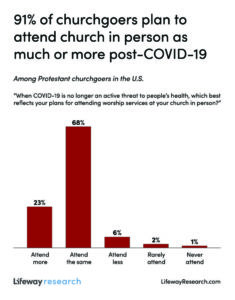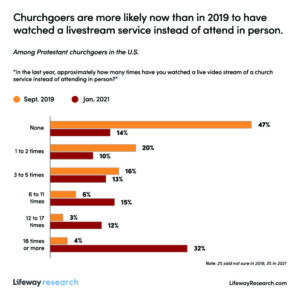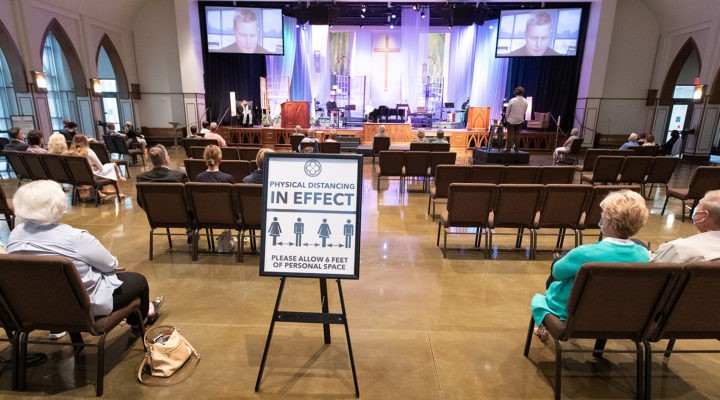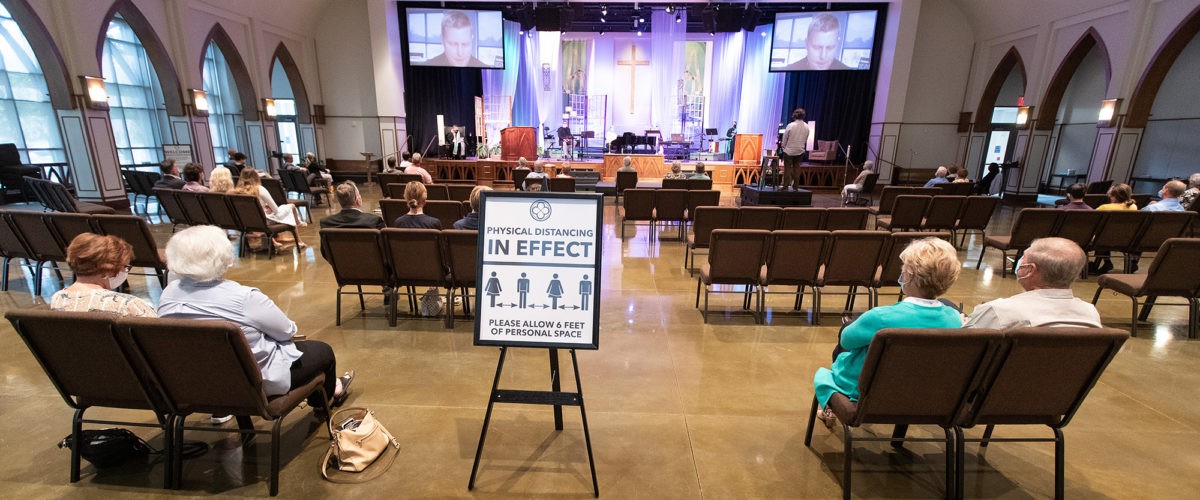The coronavirus outbreak has done little to weaken the devotion of more than 90% of American churchgoers who say they will return to in-person services in the wake of the pandemic, new research shows.
In addition to anticipated church involvement, the Lifeway Research project also asked 1,000 Protestant churchgoers about their attendance at virtual church programming and how the spread of COVID-19, which has killed 530,000 people in the United States, affected their spiritual lives.
“The faith of most churchgoers remains resilient despite a year filled with much uncertainty and fewer options for meeting in person with others from church,” Lifeway Executive Research Director Scott McConnell said in an online summary of the study conducted last month — as vaccinations were under way in the U.S. — and released March 9. “During these trying times, churchgoers were almost eight times more likely to relate to God more than less.”
 When asked about their worship plans once the pandemic no longer threatens public or personal health, 68% said they will attend church at the same levels they did before the outbreak occurred in early 2020. Another 23% said they plan to attend more often than they did before COVID, while 6% plan to attend less often. Only 2% said they would rarely attend, and 1% said they will not return.
When asked about their worship plans once the pandemic no longer threatens public or personal health, 68% said they will attend church at the same levels they did before the outbreak occurred in early 2020. Another 23% said they plan to attend more often than they did before COVID, while 6% plan to attend less often. Only 2% said they would rarely attend, and 1% said they will not return.
Nearly 95% told researchers they “greatly value” opportunities to attend services with others.
McConnell said the research should be a relief to clergy concerned about whether worshipers will return in significant numbers. “Two-thirds of pastors whose churches were open for in-person worship in January saw attendance of less than 70% of their January 2020 attendance. Many of these pastors are wondering if those who haven’t returned ever will. Nine in 10 churchgoers plan to when it is safe to do so.”
Ministers to young adults may have something to celebrate, as well: Lifeway found that 43% of churchgoers 18 to 29 years old plan to be at church with more frequency than they did before the pandemic.
The survey tracked other church-related habits of respondents throughout the coronavirus outbreak. “Almost 9 in 10 churchgoers (87%) stuck with the same church throughout the pandemic. Few say they switched to another church in the same area (5%), switched churches because of a move (3%), or no longer have a church they consider their own (5%).”
Of those churchgoers who still have a church and who attended no less than once a month in 2019, 56% attended worship four or more times in January 2020 and another 30% attended up to three times, Lifeway said.
The contrast was significant a year later. “In January 2021, however, 51% didn’t attend any in-person services — 22% said it was because none were offered by their church and 30% chose not to attend their church’s in-person services. Around 1 in 5 (21%) say they attended in person four times or more. Slightly fewer (18%) attended two to three times, and 7% attended once.”
 Lifeway reported that 83% of churchgoers chose to watch a virtual church service at least once in 2020. “Churches livestreaming services during COVID-19 has made this experience commonplace among churchgoers,” McConnell said. “Despite the increased exposure to this concept, however, relatively few have made this a weekly habit.”
Lifeway reported that 83% of churchgoers chose to watch a virtual church service at least once in 2020. “Churches livestreaming services during COVID-19 has made this experience commonplace among churchgoers,” McConnell said. “Despite the increased exposure to this concept, however, relatively few have made this a weekly habit.”
Behind the desire return to in-person worship is another survey finding: that 71% of churchgoers describe themselves as devout Christians with strong faith, while 23% consider themselves to be “not particularly devout.”
“Most churchgoers (54%) say the events of 2020 caused them to grow closer to God, including 27% who say they became much closer. Another 39% say they stayed about the same. Far fewer (7%) say they grew more distant. Currently, 11% of churchgoers say they are questioning their faith, while 87% disagree,” according to the report.
Churchgoers 18 to 29 were most likely to say they grew closer to God during the pandemic, at 37%, but also were most likely to say they are questioning their faith, at 24%.
The survey asked respondents to describe how they helped others in their churches during the pandemic. About 41% said they checked on the welfare of other members, while 38% said they were checked on during this period.
“Like other Americans, churchgoers have seen the effects of COVID-19 first-hand. Many churchgoers have also felt the benefits of being part of a church as members checked on them or provided assistance,” McConnell said.
Related articles:
What if they don’t all come back to church? | Opinion by Jason Koon
Survey says: When parents reduce church attendance, so do their teens
Americans want churches open but aren’t attending when they are open
In-person worship dropped in January as more churches were directly affected by COVID


